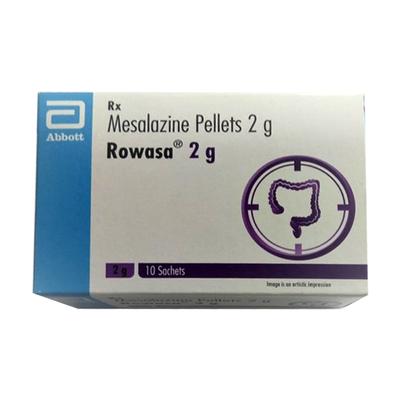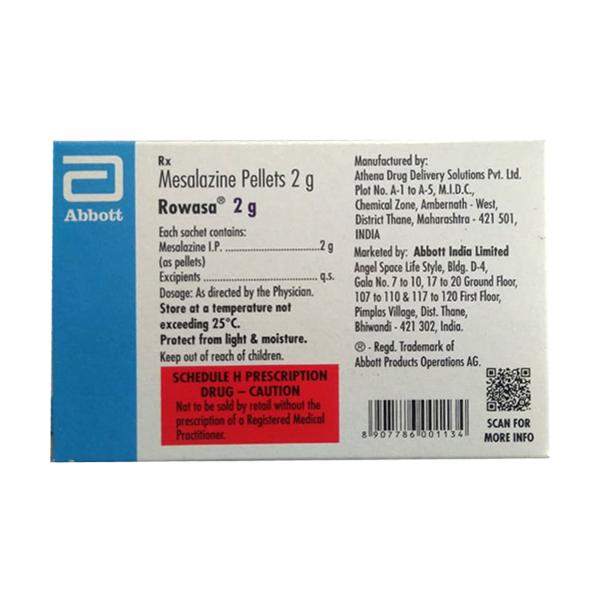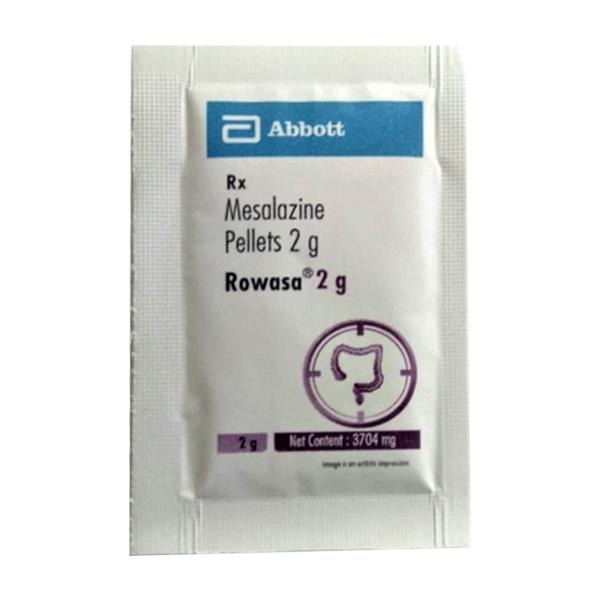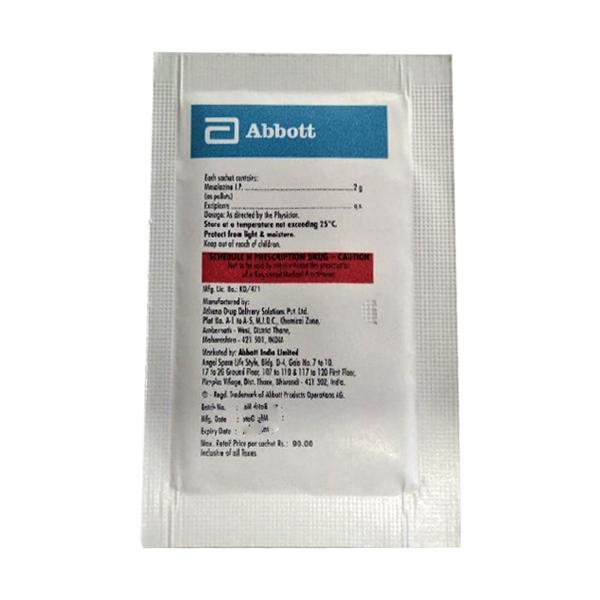

Netmeds First Membership
Quick Links
Introduction About ROWASA PELLETS
ROWASA PELLETS are an extended-release form of Mesalazine (also known as Mesalamine), specially formulated to help manage chronic bowel conditions such as ulcerative colitis and Crohn’s ileocolitis. These pellets provide targeted, sustained action throughout the entire colon, helping to control symptoms and support digestive health where it is most needed.
Take this medicine with food. Your dosage will be determined by your doctor based on your specific condition, so follow their instructions carefully. Continue using the medication for as long as your doctor advises. Stopping management too soon may cause your symptoms to return or your condition to get worse.
The most common side effects of this medicine include nausea, diarrhea, stomach pain, headache, itching, flatulence, vomiting, rash, constipation, dizziness, indigestion, and muscle pain. If these symptoms persist, worsen, or become bothersome, inform your doctor. They may be able to suggest ways to manage or reduce them. In rare cases, some individuals may experience a serious allergic reaction that requires immediate medical attention. Seek medical help right away if you notice signs such as swelling of the face, tongue, throat, or lips, unusual bleeding or bruising, rash, fever, sore throat, or extreme tiredness.
Before taking this medication, let your doctor know if you have any kidney or liver problems or if you have a blockage in your stomach. Your doctor will also consider your age to determine if this medicine is right for you. If you are pregnant or breastfeeding, consult your doctor before use. Be sure to inform your doctor about all other medicines you are taking, as some drugs may interact with this medication, altering how they work.
Uses Of ROWASA PELLETS
- Ulcerative colitis
- Crohn’s ileocolitis
Benefits of ROWASA PELLETS
1)Reduces bowel inflammation: ROWASA Pellets contain mesalazine, which works directly on the colon to reduce inflammation, helping relieve symptoms like diarrhea, stomach pain, and bleeding in conditions such as ulcerative colitis and Crohn’s ileocolitis.
2)Helps maintain long-term remission: These pellets not only manage active symptoms but also helps to reduce flare-ups and maintain remission, reducing the chance of disease recurrence with continued use.
3)Provides full-colon coverage: The extended-release formulation targets the entire colon, making it especially effective for patients who require management throughout the length of the large intestine.
4)Convenient once-daily dosing: ROWASA Pellets generally require only once-daily administration, offering greater convenience compared to some other mesalazine formulations that require multiple daily doses.
5) Reduce complications: By sustaining remission and controlling inflammation, these pellets help lower the risk of long-term complications associated with chronic bowel diseases.
6)Well-tolerated with mild side effects: Most patients tolerate ROWASA Pellets well, side effects tend to be mild, such as nausea, headache, or abdominal discomfort, and serious reactions are rare.
How ROWASA PELLETS Works
How Do ROWASA Pellets Work in the Colon?
ROWASA Pellets deliver mesalazine (mesalamine, 5-ASA) directly to the colon, where it acts locally to reduce inflammation in the intestinal lining. Their extended-release formulation ensures sustained drug levels throughout the colon, maximizing their effectiveness in managing conditions like ulcerative colitis and Crohn's ileocolitis.
Active Ingredients and Their Action
The primary active ingredient is mesalazine (mesalamine, 5-ASA). It works by inhibiting substances in the body that cause inflammation, supporting remission and reducing the recurrence of symptoms.
Topical Anti-Inflammatory Effect Explained
Mesalazine’s anti-inflammatory action is believed to be mostly topical, directly targeting the intestinal mucosa rather than acting systemically. It reduces inflammation right at the site where it is most needed by blocking key inflammatory pathways.
Role of Mesalamine in Reducing Bowel Inflammation
Mesalamine decreases the production of inflammatory mediators, leading to less abdominal discomfort, diarrhea, and rectal bleeding in chronic bowel disease patients.
Understanding Prostaglandins and Leukotrienes Inhibition
In people with inflammatory bowel conditions, there is increased production of inflammatory substances called prostaglandins and leukotrienes, which are derived from arachidonic acid via cyclooxygenase and lipoxygenase pathways. Mesalazine blocks these pathways, inhibiting both prostaglandin and leukotriene synthesis, which helps control bowel irritation and swelling.
Mesalamine and Cytokine Regulation in Ulcerative Colitis
Mesalamine may also inhibit the activation of Nuclear Factor kappa B (NFkB), a protein complex that regulates immune response and the production of pro-inflammatory cytokines. By dampening these immune signals, mesalamine helps control the chronic inflammation characteristic of ulcerative colitis. There is also evidence that it engages PPAR gamma receptors in colonic tissue, further regulating inflammation.
How to use ROWASA PELLETS
Recommended Dosage Guidelines:
- The pellets should be taken once or twice daily, depending on your condition and your doctor’s advice.
- The exact dose and duration will be determined by your doctor based on your specific medical condition. Always follow your doctor’s instructions carefully.
- Do not take more or less than the prescribed amount, and do not stop management abruptly unless directed.
How Should Rowasa Pellets Be Administered?
- Swallow the pellets whole with a glass of water. Do not crush, chew, or break them.
- Follow the timing recommended by your physician, usually once or twice a day.
- Continue taking the medicine for as long as your doctor recommends to reduce recurrence or worsening of symptoms
Tips for Safe and Effective Use
- Follow your doctor’s instructions exactly regarding dose and timing.
- Swallow the pellets whole, do not crush or chew.
- Complete the full course, even if you start feeling better.
- Inform your doctor of all other medications you are taking, as some drugs can interact with Rowasa Pellets.
- Tell your doctor if you have kidney, liver problems, or any allergies, especially to salicylates or mesalazine.
- Stay hydrated during management.
Can Rowasa Pellets Be Taken with Food?
- Rowasa Pellets can be taken with or without food. However, some sources recommend taking them preferably before meals, so consult your doctor for personalized advice.
What if I forgot to take ROWASA PELLETS
- If you miss a dose, take it as soon as you remember.
- If it is almost time for your next dose, skip the missed dose and continue your regular schedule.
- Do not double the dose to make up for a missed one.
Side Effects Of ROWASA PELLETS
Like all medicines, Rowasa Pellets may cause certain side effects in some individuals, although not everybody gets them.
The most common side effects of taking Rowasa Pellets are:
- Nausea
- Diarrhea
- Stomach pain
- Headache
- Itching
- Flatulence
- Vomiting
- Rash
- Constipation
- Dizziness
- Indigestion
- Muscle pain
When to consult your doctor?
- Allergic reactions symptoms such as rash, itching, or swelling (especially of the face, tongue, or throat), severe dizziness, trouble breathing.
- Kidney problems symptoms such as changes in urination (less or no urine), swelling in ankles or feet, unusual tiredness.
- Liver problems symptoms such as yellowing of the skin or eyes (jaundice), dark urine, severe nausea or vomiting, abdominal pain.
- Pancreatitis symptoms such as severe stomach pain (especially radiating to the back), nausea and vomiting.
- Heart problems symptoms such as chest pain or tightness, shortness of breath, fast or irregular heartbeat.
- Blood disorders symptoms such as unusual bleeding or bruising, persistent sore throat, or fever (signs of low white blood cell count).
How To Manage Side Effects
Dizziness Or Drowsiness
- Sit or Lie Down: If you feel dizzy, sit down, or lie down immediately to reduce falling. Keep your head still and close your eyes if needed.
- Hydrate: Dehydration can cause dizziness, so drink water or electrolyte-replenishing drinks like sports drinks.
- Avoid Sudden Movements: When standing or sitting, do so slowly to avoid triggering dizziness. Take your time when getting up.
- Eat Small, Regular Meals: Low blood sugar can cause dizziness, so eat small meals throughout the day and avoid skipping meals.
- Fresh Air: Sometimes dizziness can be alleviated by taking slow, deep breaths in a well-ventilated area.
Headache
- Rest in a Quiet, Dark Room: Find a calm, quiet space away from bright lights and loud noises. Lie down and close your eyes.
- Hydrate: Dehydration can contribute to headaches, so drink plenty of water.
- Apply a Cold or Warm Compress: A cold pack on your forehead may reduce pain, or a warm compress on your neck or shoulders can relieve tension.
- Over-the-Counter Pain Relief: You can take over-the-counter pain relievers like acetaminophen or ibuprofen if appropriate for you. Follow the recommended dosage.
- Practice Relaxation Techniques: Deep breathing exercises, meditation, or gentle stretching can help reduce stress and alleviate headache symptoms.
Nausea And Vomiting
- Sip Clear Liquids: Drink small sips of clear fluids like water, ginger ale, or herbal teas (ginger or peppermint are particularly helpful). Avoid drinking too much at once, which can worsen nausea.
- Eat Small, Bland Meals: Similar to stomach pain, eat light foods like crackers, toast, or bananas. Avoid greasy, spicy, or rich foods until you feel better.
- Get Fresh Air: Sometimes a little fresh air can help alleviate nausea. Take a short walk or sit near an open window.
- Use Acupressure: Applying gentle pressure to the P6 acupressure point on your wrist (located about two finger widths below the wrist crease, between the two tendons) may help reduce nausea.
- Avoid Strong Odors: Strong smells (like perfumes, cooking odors, or cigarette smoke) can trigger or worsen nausea, so it is best to avoid them if you can.
Warning & Precautions
Pregnancy
Monitoring requiredRowasa Pellets should be used with caution during pregnancy and only if clearly necessary. Limited human studies exist, but animal studies show possible harm to the unborn baby. Your doctor will weigh the benefits and risks before prescribing this medicine. Consult your doctor if you are pregnant or planning to become pregnant. Consult your doctor before taking this medicine.
Breastfeeding
Monitoring requiredRowasa Pellets may pass into breast milk and could cause allergic reactions or diarrhea in newborns. They should only be used by breastfeeding mothers if clearly necessary and under medical supervision. If your baby develops diarrhea while you are taking this medicine, discontinue breastfeeding and consult your doctor immediately. Consult your doctor before taking this medication.
Driving and Using Machines
Use with CautionRowasa Pellets are unlikely to affect your ability to drive or operate heavy machinery. You can safely perform such activities unless you feel unwell or experience symptoms like dizziness.
Alcohol
Consult your doctorCaution is advised when consuming alcohol with Rowasa Pellets. Consult your doctor before using alcohol while on this medication, as alcohol may aggravate certain side effects.
Kidney
Consult your doctorRowasa Pellets should be used with caution in patients with kidney problems and is not recommended for use in patients with severe kidney problems. Dosing adjustments may be needed. Regular kidney function monitoring may be necessary. Consult your doctor before taking this medication.
Liver
Use with CautionRowasa Pellets should be used with caution in patients with liver problems. Dose adjustment may be required. Inform your doctor about any existing liver conditions. Consult your doctor before taking this medication.
Allergy
ContraindicatedRowasa Pellets is not recommended for use if you are allergic to mesalazine or sulfasalazine or any other salicylates or any other components of this medicine.
Lungs
Use with CautionRowasa Pellets should be used with caution in patients with pre-existing lung disease or asthma as mesalazine may rarely worsen respiratory symptoms. Inform your doctor if you have any history of lung disorders. Consult your doctor before taking it.
Heart Disease
Use with CautionRowasa Pellets should be used with caution in patients with heart diseases. Inform your doctor if you have any heart problems before taking this medicine.
Use In Pediatrics
Consult your doctorRowasa Pellets are not recommended for children under 6 years of age due to insufficient safety and efficacy data in this age group. The use of Rowasa Pellets in pediatric patients should only be considered if clearly advised by a doctor, with special attention to dosing and monitoring. Always consult your pediatrician before giving this medicine to children, as age, weight, and disease severity may require individualized assessment and adjustments.
Use In Geriatrics
Use with CautionRowasa Pellets should be used with caution in elderly patients. Kidney and liver function should be monitored regularly, as elderly patients may be more susceptible to side effects. Dose adjustments may be necessary. Consult your doctor before taking it.
Other Warnings for ROWASA PELLETS
Before taking ROWASA PELLETS, inform your doctor if you:
- Suffer from an active peptic ulcer (stomach or duodenal ulcer)
Who should not take [GBNKEYWORD
ROWASA PELLETS is not recommended for use if you:
- Bleeding disorders
Diet and Lifestyle Advice
Are there any dietary or activity restrictions while taking ROWASA Pellets?
|
Aspect |
Recommendation / Restriction |
Notes & Rationale |
|
Diet |
No strict or specific dietary restrictions. |
A balanced diet is advised for best management. |
|
Dairy |
Limit intake if you have difficulty digesting dairy. |
Taking with milk can ease stomach irritation. |
|
Spicy/Oily Foods |
Prefer simple, easily digestible meals; avoid spicy or oily foods. |
Can help minimize gastrointestinal discomfort. |
|
Sugary Snacks/Drinks |
Avoid excessive sugary foods/drinks. |
Reduce additional digestive irritation. |
|
Hydration |
Stay well-hydrated. |
Helps support digestive health. |
|
Alcohol |
Avoid or limit alcohol; it may worsen stomach/intestinal irritation and increase liver risks. |
Especially important for those with liver issues. |
|
Activity |
No specific restrictions. |
Maintain usual activity unless otherwise directed. |
|
Meal Timing |
Can be taken with or without food. |
Taking with food may reduce stomach upset. |
|
NSAIDs |
Avoid NSAIDs like ibuprofen, aspirin. |
These can worsen symptoms or interact adversely. |
Drug - Drug interaction
Inform your physician if you are taking any of the following medicine before taking Rowasa Pellets:
1.Azathioprine and 6-Mercaptopurine (immunosuppressants):
Interaction: Rowasa Pellets can increase the risk of blood disorders when used with these medications.
Effects: Possible reduction in white blood cell count, anemia, or bone marrow suppression.
Management: Your doctor may monitor your blood cell counts more closely, and dose adjustments may be needed.
2.NSAIDs (such as ibuprofen, diclofenac, celecoxib):
Interaction: Using Rowasa Pellets with NSAIDs may raise the risk of kidney impairment.
Effects: Increased chance of kidney damage or changes in kidney function.
Management: Avoid this combination if possible. If used together, your doctor will likely monitor your kidney function regularly.
3.Proton Pump Inhibitors and H2 Blockers (such as omeprazole, pantoprazole, lansoprazole, esomeprazole, nizatidine):
Interaction: These medicines can decrease the effectiveness of Rowasa Pellets by altering gastric pH.
Effects: Reduced anti-inflammatory action in the bowel.
Management: Your doctor may recommend avoiding this combination or will monitor management effectiveness and may adjust your therapy as needed.
4.Live Vaccines (such as MMR, varicella):
Interaction: Using Rowasa Pellets with live vaccines can increase the risk of vaccine-related complications.
Effects: Higher chance of adverse effects or reduced vaccine effectiveness.
Management: Avoid salicylate (including mesalazine) use for several weeks after vaccination, as advised by your doctor.
5.Other drugs that affect blood counts (such as methotrexate):
Interaction: There is an increased risk for further suppression of blood cells.
Effects: Greater likelihood of developing anemia, increased risk of infections or bleeding.
Management: Frequent blood tests and dose adjustments may be required.
6.Blood thinners (anticoagulants such as warfarin, heparin):
Interaction: Rowasa Pellets may alter the effect of blood thinners, potentially increasing bleeding risk.
Effects: Greater susceptibility to bruising, bleeding, or clotting problems.
Management: Your doctor will closely monitor your blood clotting parameters (such as INR) and may adjust blood thinner dosages as necessary.
Synopsis
|
Drug |
: |
Mesalazine (also known as Mesalamine) |
|
Pharmacological Category |
: |
Aminosalicylates |
|
Therapeutic Indication |
: |
Ulcerative colitis, Crohn’s ileocolitis |
|
Dosage Forms |
: |
Tablets, Suppositories, Sachet, Granules, Powder, Pellet, Enema |
More Information
1.How do ROWASA Pellets (granules) compare to tablets, suppositories, or enemas in terms of convenience, absorption, and effectiveness, and how can this help patients understand their management options?
|
Formulation |
Convenience |
Absorption/Delivery |
Clinical Outcomes |
Best for |
|
ROWASA Pellets (Granules) |
Convenient once-daily dosing; oral use; easily taken with or without food; do not crush or chew |
Extended-release targets the full colon; starts in distal small bowel and continues throughout colon |
Effective for extensive colitis, induction, and maintenance of remission |
Patients needing full colon coverage and prefer oral therapy |
|
Tablets (e.g., Asacol, Lialda, Pentasa) |
Oral dosing; frequency varies (once to several times daily depending on formulation) |
Some release in terminal ileum, others throughout colon; varies by brand and coating |
Effective for extensive colitis; some require higher daily dose for better efficacy |
Extensive or left-sided colitis; patients preferring oral route |
|
Suppositories |
Requires rectal administration, once daily or as prescribed |
Local delivery to rectum and distal sigmoid colon (distal 20 cm) |
Superior symptom relief for distal/rectal inflammation |
Distal ulcerative colitis (proctitis), patients with rectal-only symptoms |
|
Enemas |
Rectal use, may be less convenient, especially long-term; typically used at bedtime |
Targets rectum to splenic flexure (distal/left-sided colon, up to ~60 cm) |
Rapid, strong effect for distal and left-sided disease; combined oral/rectal therapy more effective for widespread active disease |
Left-sided UC or extensive UC as add-on to oral therapy for flares |
Conclusion:
- ROWASA Pellets: Best for patients needing whole-colon coverage and preferring oral, extended-release, once-daily dosing. Less effective for purely rectal inflammation compared to rectal products, but more convenient for long-term use and extensive disease.
- Tablets: Also oral, but dosing schedules vary. Some formulations provide full-colon therapy, though not all deliver equivalent distal colonic concentrations.
- Suppositories/Enemas: More effective for proctitis/distal disease but less convenient due to rectal administration. Quicker local symptom relief.
- Combination oral + enema: Most effective for extensive active UC, especially during flares.
FAQs About ROWASA PELLETS
Q: What is Rowasa Pellets used for?
A: Rowasa Pellets are primarily used to manage and manage ulcerative colitis, a chronic inflammatory condition of the large intestine, and may also be prescribed for Crohn’s ileocolitis. They help relieve symptoms like diarrhea, stomach pain, and bleeding by reducing bowel inflammation.
Q: How does Rowasa Pellets work?
A: Rowasa Pellets contain mesalazine (mesalamine), which acts as a topical anti-inflammatory agent in the intestines. It works by inhibiting the production of certain chemical substances, such as prostaglandins, that cause pain and swelling in the bowel.
Q: How should I take Rowasa Pellets?
A: Take Rowasa Pellets exactly as your doctor prescribes. Swallow the pellets whole with water; do not crush or chew them. They can be taken with or without food, but taking with food may help reduce stomach discomfort. Continue the medication for as long as recommended to keep symptoms in remission.
Q: What are the common side effects of Rowasa Pellets?
A: Common side effects may include nausea, diarrhea, stomach pain, headache, gas, and vomiting. Most are mild and transient, but if they persist or worsen, consult your doctor.
Q: Are there any serious side effects I should watch for?
A: Rare but serious side effects include allergic reactions (swelling of face, lips, tongue, or throat), unusual bleeding or bruising, severe rash, fever, sore throat, excessive tiredness, or signs of kidney/liver problems. Seek medical attention immediately if you experience any of these.
Q: Can Rowasa Pellets be used in children?
A: Rowasa Pellets are not recommended for children under 6 years of age. Safety and effectiveness in younger children have not been established. Always consult a pediatrician before using this medicine in children.
Q: Can I take Rowasa Pellets if I am pregnant or breastfeeding?
A: If you are pregnant or breastfeeding, consult your doctor before taking Rowasa Pellets. They should only be used under medical supervision when clearly needed.
Q: Who should not take Rowasa Pellets?
A: Do not take Rowasa Pellets if you have allergies to mesalazine, salicylates (like aspirin), or any ingredient in the pellets; severe kidney or liver disease; or a history of allergic reactions to similar medicines. Always inform your doctor about your full medical history.
Q: Can Rowasa Pellets cure ulcerative colitis?
A: Rowasa Pellets help control symptoms and maintain remission of ulcerative colitis but do not cure the disease. Long-term adherence to management is important to reduce flare-ups.
Q: Are there any dietary or activity restrictions with Rowasa Pellets?
A: No specific dietary or activity restrictions, but maintaining a balanced diet and staying hydrated is advised. Avoid alcohol and NSAIDs, as these may worsen symptoms or interact with the medication. Always talk to your doctor about your personal situation.
Q: What should I do if I miss a dose?
A: If you miss a dose, take it as soon as you remember. If it is almost time for your next dose, skip the missed dose, do not double your next dose to make up for it. Consult your doctor for advice on missed doses.
Q: Is regular monitoring needed while taking ROWASA Pellets?
A: Yes, regular monitoring is important, especially to check kidney, liver, blood, and lung health. This is particularly crucial for older adults or those with existing health conditions to reduce potential complications.
Q: Can ROWASA Pellets be used by all age groups?
A: The suitability of ROWASA Pellets depends on factors such as age and overall health. It is not recommended for children under 6 years old. Always consult a doctor to confirm whether ROWASA Pellets are appropriate for individual use, including in pediatric and geriatric patients.
Q: What makes ROWASA Pellets different from other mesalamine forms?
A: ROWASA Pellets provide a unique extended-release formulation that delivers medicine consistently throughout the colon. This allows for usually fewer daily doses, improving convenience and adherence compared to other forms like tablets, suppositories, or enemas.
References
1. KD. Tripathi. Drugs for Constipation and Diarrhoea. Essentials of medical pharmacology. Seventh edition. 2013. Page – 684.
2. Marietta Iacucci, Shanika de Silva, Subrata Ghosh. Mesalazine in inflammatory bowel disease: A trendy topic once again? NIH National Library of Medicine. National Center for Biotechnology Information. PMC PubMed Central. [Revised in February 2010] [Accessed on 21st July 2025] ![]()
3. Ashwin N. Ananthakrishnan, Tamara Donaldson, Karen Lasch, Vijay Yajnik. Management of Inflammatory Bowel Disease in the Elderly Patient: Challenges and Opportunities. NIH National Library of Medicine. National Center for Biotechnology Information. PMC PubMed Central. [Revised in June 2018] [Accessed on 21st July 2025] 
4. Ferring GmbH. Health Products Regulatory Authority (HPRA). [Revised in February 2022] [Accessed on 21st July 2025] 
5. Taj Pharma India. Meslataj 0.5gm/1gm/2gm. [Accessed on 21st July 2025] 
Useful Diagnostic Tests
- Colonoscopy
- Sigmoidoscopy












